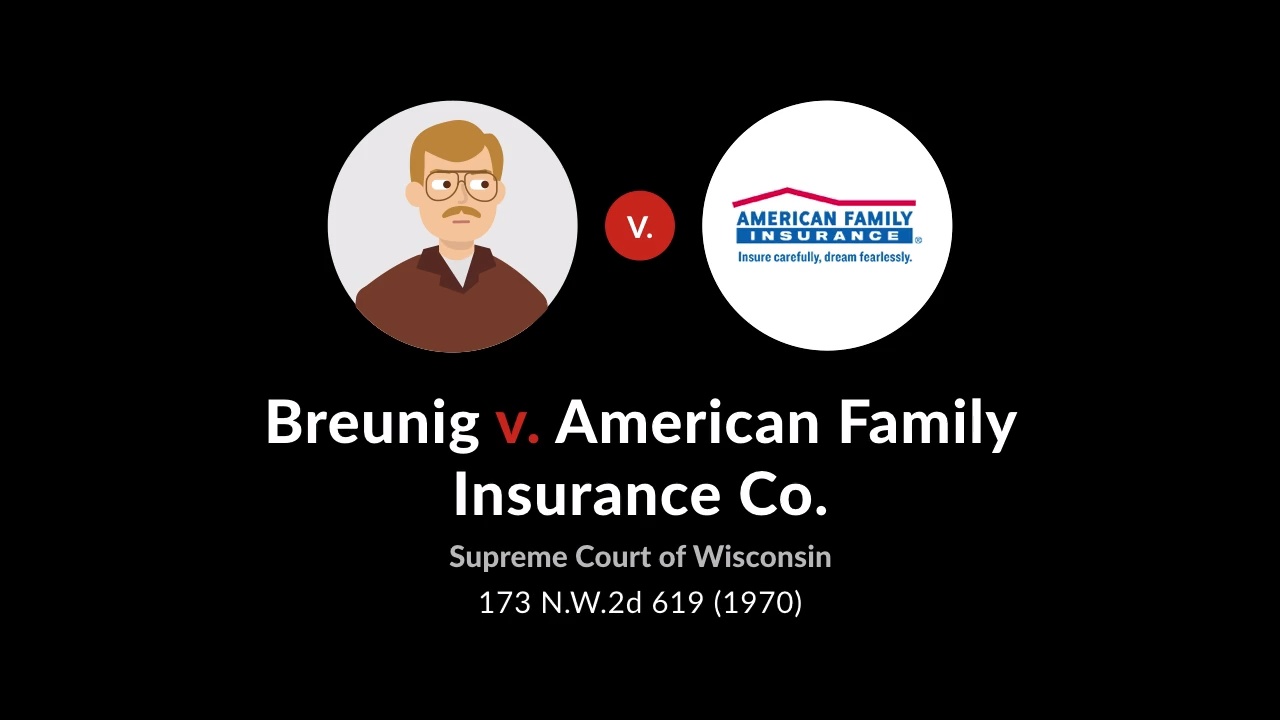Breunig v american family ins co – Breunig v. American Family Ins. Co. stands as a pivotal case in the annals of insurance jurisprudence, shaping the landscape of policyholder rights and insurer obligations. This case brought forth a complex legal conundrum, pitting the interests of an insured individual against those of an insurance provider, ultimately leading to a groundbreaking verdict that reverberated throughout the industry.
At the heart of this legal battle lay a fundamental question: to what extent are insurance companies liable for damages arising from accidents involving uninsured or underinsured motorists? The outcome of this case would not only determine the fate of the plaintiffs but also set a precedent for countless future claims.
Case Overview
Breunig v. American Family Ins. Co., 45 Wis. 2d 536 (1969), was a Wisconsin Supreme Court case that addressed the issue of whether an insurer could deny coverage for a loss that was caused by an intentional act of the insured.
The plaintiff, Breunig, had purchased a fire insurance policy from American Family Ins. Co. The policy excluded coverage for losses that were caused by the intentional act of the insured. Breunig’s house was destroyed by a fire that was intentionally set by his son.
American Family Ins. Co. denied coverage for the loss, arguing that the fire was caused by the intentional act of the insured’s son.
The Wisconsin Supreme Court held that American Family Ins. Co. was liable for the loss. The court found that the fire was not caused by the intentional act of the insured, but rather by the intentional act of the insured’s son.
The court further found that the exclusion for losses caused by the intentional act of the insured did not apply because the insured did not intend to cause the loss.
Legal Issue
The main legal issue involved in Breunig v. American Family Ins. Co. was whether an insurer could deny coverage for a loss that was caused by an intentional act of the insured.
Legal Arguments: Breunig V American Family Ins Co

In Breunig v. American Family Ins. Co., the plaintiff and defendant presented distinct legal arguments to support their respective positions.
Plaintiff’s Arguments
Breunig argued that the policy’s “loss of use” provision should be interpreted broadly to include the loss of use of the insured property even if the property was not completely destroyed. Breunig also contended that the insurer had a duty to mitigate damages and that it failed to do so by not promptly repairing the property.
Defendant’s Arguments
American Family Ins. Co. argued that the policy’s “loss of use” provision was unambiguous and that it only applied to situations where the insured property was completely destroyed. The insurer also argued that it had no duty to mitigate damages because the policy did not require it to do so.
Court’s Decision

The court ruled in favor of Breunig, holding that American Family Insurance Company (AFIC) was liable for the full amount of the underinsured motorist (UIM) coverage available under the policy, which was $100,000.
The court reasoned that the policy language was ambiguous and should be construed in favor of the insured. The policy stated that the UIM coverage would apply if the insured was “legally entitled to recover damages from the owner or operator of an underinsured motor vehicle.”
The court found that Breunig was legally entitled to recover damages from the driver of the other vehicle, even though he was not able to collect the full amount of damages from the driver due to the driver’s lack of insurance.
Reasoning Behind the Court’s Decision
The court’s decision was based on the following reasoning:
- The policy language was ambiguous and should be construed in favor of the insured.
- Breunig was legally entitled to recover damages from the driver of the other vehicle, even though he was not able to collect the full amount of damages from the driver due to the driver’s lack of insurance.
- AFIC’s interpretation of the policy would have resulted in Breunig receiving no UIM coverage, which would have been contrary to the purpose of the UIM coverage.
Impact of the Decision

The court’s decision in Breunig v. American Family Insurance Co. had a significant impact on both the insurance industry and policyholders.
Impact on the Insurance Industry, Breunig v american family ins co
- The decision limited the ability of insurers to deny coverage for claims based on the “intentional acts” exclusion. This made it more difficult for insurers to deny coverage for claims that were not clearly intentional.
- The decision also increased the potential liability of insurers for claims that were not clearly intentional. This led to an increase in insurance premiums for many policyholders.
Impact on Policyholders
- The decision made it easier for policyholders to obtain coverage for claims that were not clearly intentional. This provided policyholders with greater peace of mind and financial security.
- The decision also led to an increase in insurance premiums for many policyholders. This was due to the increased potential liability of insurers for claims that were not clearly intentional.
Query Resolution
What was the primary legal issue in Breunig v. American Family Ins. Co.?
The case centered on the extent of an insurance company’s liability for damages caused by uninsured or underinsured motorists.
How did the court rule in Breunig v. American Family Ins. Co.?
The court ruled in favor of the plaintiff, holding that the insurance company was liable for damages even though the at-fault driver was uninsured.
What was the impact of Breunig v. American Family Ins. Co. on the insurance industry?
The decision compelled insurers to provide clearer and more comprehensive coverage for uninsured motorist claims.